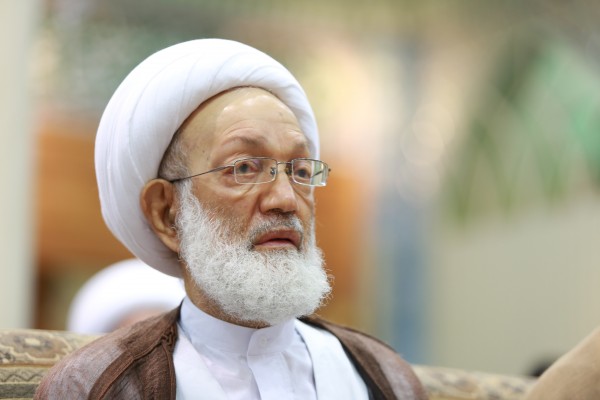On Sunday, 7 May 2017, Bahraini courts will reconvene for another hearing in the trial of Sheikh Isa Qassim. Sheikh Qassim is one of the most prominent spiritual leaders in Bahrain, and he has been targeted by government authorities for traditional Shia practices. In June 2016, amidst a wave of harsh civil and political repression in Bahrain, government authorities announced that they had stripped the citizenship of Sheikh Qassim. The Government of Bahrain then subsequently brought charges against Sheikh Qassim for money laundering, which is related to his participation in the religious practice of khums. The actions taken by the Bahraini government against Sheikh Qassim sent a substantial number of Bahrainis to the streets to protest the decision. This protest has since turned into a peaceful sit-in around Sheikh Qassim’s home in Diraz to support one of the most senior Shia leaders in the country.
Quickly following the announcement of Sheikh Qassim’s arbitrary citizenship revocation, the US administration came out with a statement of condemnation. State Department Press Secretary John Kirby stated: “We are alarmed by the Government of Bahrain’s decision to revoke the citizenship of prominent Shia cleric, Sheikh Isa Qassim. We remain deeply troubled by the Government of Bahrain’s practice of withdrawing the nationality of its citizens arbitrarily, the overall precedent that this case could establish, and the risk that individuals may be rendered stateless. Our concern is further magnified by reports that Sheikh Qassim was unable to respond to the accusations against him before this decision was taken, or challenge the decision through a transparent legal process.” Additionally, the State Department commented further on Sheikh Qassim’s case in the 2016 Country Report on Human Rights. The report takes a look at the broader issue of arbitrary citizenship revocation in the country, specifically in relation to Sheikh Qassim’s case.
The US Commission on International Religious Freedom (USCIRF) has also recently reported on Sheikh Qassim’s case. Released in April 2017, the USCIRF annual report for 2016 for the first time intensified the ranking of Bahrain and categorized the country as a Tier 2 violator of religious freedom. The documentation in the report cited an increased campaign of judicial harassment targeting Shia clerics, “mostly on unfounded or unsubstantiated charges” and cited Sheikh Qassim’s case. In addition to Sheikh Qassim’s case, the USCIRF report documented that since June, the Bahraini government has interrogated, charged, or sentenced at least 80 Shia clerics.
Ahead of the trial on Sunday, 7 May, the US Administration should follow up on previous statements of condemnation and call for the Bahraini government to drop the charges against Sheikh Isa Qassim. Additionally, the Bahraini government should swiftly reinstate Sheikh Qassim’s citizenship after arbitrary revocation in 2016.





